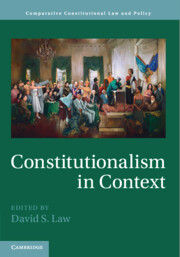Book contents
- Reviews
- Constitutionalism in Context
- Comparative Constitutional Law and Policy
- Constitutionalism in Context
- Copyright page
- Dedication
- Contents by Topic
- Contents by Region
- Figures
- Tables
- Contributors
- User’s Guide and Preface
- Abbreviations
- I Introduction to the Field
- II Concepts and Definitions
- III Constitutional Drafting and Revision
- IV Constitutional Adjudication and Interpretation
- V Rights
- VI Structure
- VII Challenges to Liberal Democratic Constitutionalism
- 20 Islamic Constitutionalism: Iran
- 21 Military Influence on the Constitutional Order: Turkey
- 22 Constitutional Backsliding: Colombia
- 23 Privatization of Constitutional Law: Thailand
- Index
- References
23 - Privatization of Constitutional Law: Thailand
from VII - Challenges to Liberal Democratic Constitutionalism
Published online by Cambridge University Press: 17 February 2022
- Reviews
- Constitutionalism in Context
- Comparative Constitutional Law and Policy
- Constitutionalism in Context
- Copyright page
- Dedication
- Contents by Topic
- Contents by Region
- Figures
- Tables
- Contributors
- User’s Guide and Preface
- Abbreviations
- I Introduction to the Field
- II Concepts and Definitions
- III Constitutional Drafting and Revision
- IV Constitutional Adjudication and Interpretation
- V Rights
- VI Structure
- VII Challenges to Liberal Democratic Constitutionalism
- 20 Islamic Constitutionalism: Iran
- 21 Military Influence on the Constitutional Order: Turkey
- 22 Constitutional Backsliding: Colombia
- 23 Privatization of Constitutional Law: Thailand
- Index
- References
Summary
Private regulators operating across national borders play and increasingly important role in areas once occupied exclusively by states and state law. These new regulators and their regulatory regimes challenge state-centred conceptions of law, including public law. The Equator Principles (EP) make up a private transnational regime that seeks to regulate infrastructure project finance world-wide. It includes detailed environmental and social impact standards and procedures. After offering a primer on Thailand’s constitutional system, the chapter turns to a case study of the Equator Principles regime that explains how it works, explores its impact in Thailand, and considers its implications – practical, conceptual, and normative – for the uncertain boundaries between private law and public/constitutional law in Thailand.
Keywords
- Type
- Chapter
- Information
- Constitutionalism in Context , pp. 517 - 540Publisher: Cambridge University PressPrint publication year: 2022

